Roaches thrive in the sewage system. Cockroaches are flexible enough to fit through any small cracks or gaps, so your drains and pipes provide entry points to your shower drain, bath drain, kitchen sink, bathroom sink, and toilet(s). Modern plumbing is designed to keep most sewer roaches out, but it’s definitely not a system without flaws.
Cockroaches can enter your home via drains as they’re connected directly to the sewage system. Your shower drain, kitchen drain, and floor drain are all easy entry points for these opportunistic, invasive pests. Modern toilets that are well maintained and functioning are difficult to enter as they’re fitted with water traps.
Most, but not all, homes don’t have cracked pipes that are left unattended. Of all the disrepair that an apartment building or house may have, water leaks are usually dealt with most quickly. However, if you ever find cockroaches congregating around your drains, it’s a problem that needs to be addressed immediately.
Do Cockroaches Come Up Through Bathroom Drains?
Cockroaches will come through your bathroom drains. Whether the drains are used infrequently or every day, they are still portals to the outside world. Cockroaches can enter your home through the smallest holes. They will look for access in the pipes via a crack, leak, or other means. If found, you can be sure cockroaches will exploit it.
Can Roaches Come Up the Toilet?
In theory, roaches can come up your toilet. However, it’s difficult for them to access your home. Here’s why:
- Due to a water trap, most toilets are designed to prevent waste or bugs from entering the bowl.
- Toilets are constantly full of water, so the roaches would have to swim.
- Toilets are used frequently, so it’d be difficult for cockroaches to make progress up the pipe.
- Unlike sinks or floor drains, toilets create a suction that increases water pressure when flushed.
As long as your toilet is working and filled with water, no roach will climb up while you’re sitting there. The only toilets in danger of a roach invasion are:
- Dry toilets, allowing roaches to climb up the pipes, not swim.
- Toilets in disrepair, with a broken water trap.
- Old toilets that lack a water trap.
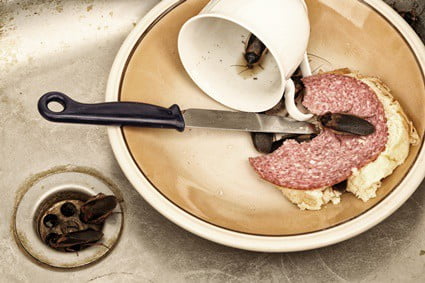
Can Cockroaches Swim?
A kitchen sink drain will be used regularly, as will a toilet. If roaches can swim, won’t they circumvent the water and be able to enter your home that way? Worse still, will they use the water to paddle up through your drains?
Cockroaches are terrible swimmers. Their legs can’t propel them efficiently. Whether in water or underwater, they will tread water. You may find them lightly spinning in circles, but that’s the most traction they can get. On the rare occasions that they’re forced to swim, they survive due to two physical advantages. They can:
- Hold their breath for up to 40 minutes
- Float efficiently
Roaches can withstand being submerged in a sewage tank or blasted with the water pressure of a flushing toilet. However, while they won’t drown, they won’t overcome it either. If you run water down your shower drain, kitchen sink, or toilet, you’re not providing a swimmable entryway to your home. In fact, you’re washing out cockroaches.
Can Roaches Float Up Your Drains?
Because roaches are good floaters, you may find one bubbling up through a clogged drain. If the pipe is full of water and a cockroach is inside, it can use its floating abilities to crawl up a drain or pipe. It will be completely by chance, though, and a functional water trap will prevent it from happening in your toilet.
Can Roaches Come Up the Shower Drain?
Of all the drains in your home, shower drains may be the most appealing to roaches. Showers have ample food sources washed down them, including:
You likely won’t clean a shower drain as often as a kitchen sink, resulting in a material build-up. The good news is that most shower drains have a protective covering over them. Depending on the thickness of the holes, cockroaches may be unable to pass through. However, your drain may be open or have a covering with larger gaps.
Do Cockroaches Come Up All Floor Drains?
Cockroaches don’t play favorites when it comes to drains. However, you may notice drains that receive less usage being used by roaches. Examples include a floor drain in your garage or outdoor shop.
Food sources won’t tantalize roaches. However, these drains have access to the sewer and see much less activity. Without the barrier of water constantly washing them down, roaches can easily gain access to your home.
Why Do Roaches Come Up Drains?
Cockroaches are opportunistic pests. They will take any chance they get to access food, shelter, and humidity. With that said, outside forces could be motivating your roaches to come up the drains.
Following Other Cockroaches
Roaches have a keen sense of smell and will follow scent trails. As such, if roaches smell the presence of other roaches in your drains, they’ll head in that direction.
Odor
Like the smell of kitchen food or a scent trail of other roaches, you may find organic waste luring in roaches. This can include uncleaned drains. For example, shower drains with a build-up of hair or soap can be tempting.
Exploring
Cockroaches are natural explorers. In their constant search for food and optimal temperatures, they’ll go anywhere. By chance alone, this can include your pipes. If there’s a consistent water flow as a barrier, that may deter them. In any other case, your drain will serve as a natural route in their journey.
Sewage Back-Up
A backed-up sewer may be caused by:
- Clogging due to waste
- Faulty pipes
- Blockages
Any roaches living in your sewer may flood up the pipes. As water and waste are forced up, the roaches will go with it.
Flood
Rain can cause local sewers to overflow and flood. Any roaches living in the sewer could be forced into finding a new, drier home in these circumstances. If that happens to be a pipe leading to your drain, then you may find that cockroaches enter your home via the drainage system.
Fleeing Insecticides
Insecticides are used for killing or deterring cockroaches. However, they may also chase roaches in the wrong direction. Have you ever:
- Washed insecticides down the drain?
- Sprayed insecticides around your yard?
- Poured insecticides along your foundation?
Then any cockroaches in these areas may be running away from the poison and into your pipes. From there, it’s not difficult to find your drain and, consequently, gain access to your home.
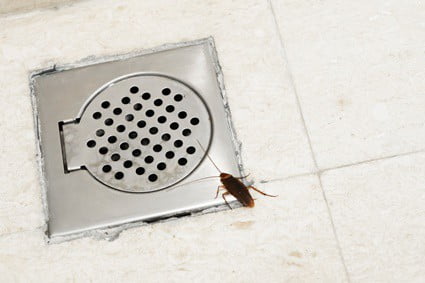
Are Roaches Coming from My Sewer?
Cockroaches live, breed, and die in sewers. In fact, roaches are so common in sewers that the Journal of Medical Entomology called them “the most important invasive urban pest of sewer environments.” This is especially true in cold temperatures as sewers provide a warm, moist haven for cockroaches.
Most live there harmlessly, unable to affect your house or apartment. However, as the population grows, roaches may be forced to expand their territory. You’ll find them roaches your yard, foundation, and coming up your drains.
In urban settings, this is especially true during rainy seasons. Cockroaches like moisture but can’t live in water for long periods of time. If you have a drain that rarely sees water, look for cockroaches coming from the sewer line.
Most homes, apartments, and cities as a whole will design their plumbing to prevent access. The most important aspect is an elbow joint (or several, depending on the size of your system). The joint will have water in it, creating a barrier. This not only keeps roaches out of your drains but also gasses from the sewer.
If the water has dried up for whatever reason, the cockroaches (as well as odors) can easily crawl up your drain.
Sewer Roach Vs. Cockroach
Sewer roaches and cockroaches are the same. The most common sewer roach is the American cockroach.
It’s larger than most of its kind, at about 2-3 inches long. This has contributed to the view of it being the super version of its average brethren. In actuality, the American cockroach is large for the same reason a German cockroach is small: Its genetics alone, not its environment that makes it this way.
A life filled with ample food will make a cockroach grow larger. However, you can rest easy that your drains won’t produce super breeds. The only danger of leaving them unchecked is that they will grow in size.
How To Stop Roaches From Coming Up Drains
It’s unsanitary to let roaches invade your drains. According to Epidemiology and Infection, cockroaches have the capability to spread bacteria and disease. To keep them from scurrying up your pipes and spreading sewer filth, you can use these solutions:
Find Cracks And Leaks
If there are cracks or holes that a roach might get into, you can seal them with caulk or plaster. Even the tiniest crack can become a bigger hole in the future. If the leaks or damage are more severe, you may need to contact a plumber.
Stop Up Drains
Since cockroaches are nocturnal, you can get a stopper or cover for your drains at night. This will cut off their entry point. By denying them food during their active times, they will visit less often.
For the day, you can use a rubber drain cover or a metal drain screen to block their entrance. This prevents the cockroaches from getting in or out of the drain. While it doesn’t solve the problem, it certainly limits the damage of them roaming free.
Fix Leaky Faucets
Standing water in your sink can attract cockroaches. It may only be enough to moisten the drain or sink, but it’s enough. Always:
- Check your sink, shower, and other water sources for leaks
- Seal up the crevices or cracks around the faucet and pipes
Address Condensation
If you notice condensation around your drain pipes, deal with that as well. Since cockroaches like a humid space, the condensation will attract them.
You can use expanding insulation foam to seal spaces around your pipes. This helps keep condensation at a minimum. When you get rid of the water source, roaches will go somewhere else for it.
Move Trash
Is your trash can under the sink in your bathroom or kitchen? Then it’s wise to move it. The trash will attract roaches to that space. Since there are usually pipes in the area below the sink, this provides an open invitation.
Clean Up The Surrounding Area
Don’t leave dirty dishes, food, or trash in your kitchen sink overnight. The smell could attract roaches to come through your pipes and out through your drain. Likewise, be sure to clean up food on the counters, especially overnight. Even leaving food out in containers may provide a tempting scent.
Dry The Sink
Roaches are attracted to any humid or wet place. After you wash your dishes or clean out the sink, pat it dry. This will leave no water sources to bring roaches up the drain.
Clean The Pipes Regularly
A build-up of soap, food, or other organic material can coat the walls with ample food sources for a roach. It will also provide texturing on the pipe walls that a roach will use to climb.
Did Cockroaches Really Come From My Drain?
If you find roaches near your drain, don’t immediately blame your pipes or sewer. It’s possible the cockroaches didn’t gain access through your drain. Instead, they may have snuck into your home through other means and are now living in your drains.
Why Do Cockroaches Live In Drains?
Roaches live in drains that don’t see much use. This may include:
- A shower in a bathroom only used by guests
- A sink in your garage
- A floor drain in your shop
Without water or waste routinely passing down it, the drain offers advantages to cockroaches. These include:
Place To Hide
Cockroaches prefer dark, quiet places to nestle themselves away in. This is especially true if they hear activity or loud noises, like a human walking or a pet hunting nearby. The cockroaches may be using your drain as a haven to keep themselves safe.
Breeding Location
Since cockroaches are prolific breeders, it won’t take long for reproduction to happen. Roaches prefer to be in a safe, out-of-the-way place to avoid getting confronted by predators as they reproduce.
Somewhere To Lay Eggs
The female may lay eggs inside your drains. If the pipes are unused, they will serve as isolated spots with firm walls. These are ideal for planting egg sacs, which can grow undisturbed. In floor drains, the pipes might also be covered in mildew, hair, or other organic waste. This can be a food source for baby roaches.
An Area To Sleep During The Day
Cockroaches don’t sleep, but they do enter an immobility period. Here, they recoup their energy and are more vulnerable to attacks. A drain serves as a small, secure, dark place to rest.
What To Pour Down The Drain To Stop Roaches
Cockroaches are hard to kill, and pipes are easy to damage. It’s important to choose the right substance to pour down your infested drains. These quick home solutions may not kill roaches, but they will deter the pests. These methods are also safe for your drains if used in the right quantities:
Water
Dry pipes or drains are an open invitation. If you have floor drains, sinks, or toilets that are rarely used, be sure to:
- Pour two cups of plain water into all of them
- Do this at least once a month
This will help flush out any roaches building (or have built) a haven in the drains. If you live in a hot or dry climate, you’ll need to do this once a week. The pipes and drains will dry more quickly than in damp, humid climates.
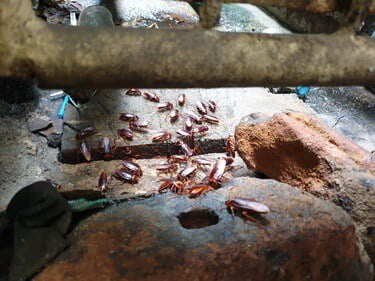
Cooking or Mineral Oil
In combination with the above, you can pour a small amount of cooking or mineral oil down your drain. When properly diluted, this will not affect your septic tank or plumbing.
Instead, it will prevent the water from evaporating as quickly. That’s because the oil will sit on top of the water. This stops the evaporation process from taking place for weeks or even months.
- Do this every 6 weeks, up to every 2 months.
- This should only be done with water, as oil alone can clog up your pipes.
Boiling Water
If you know the roaches are present, then try pouring boiling water down the drain. This can scorch the cockroaches. In the best event, it will kill them. At the very least, it will wash them down the drain and into the sewer, where they may struggle to return. The water must be boiling. If it’s simply warm, it may have no effect.
Trap Primer
You can have a trap primer installed by a plumber at each entrance of your water supply. The primer detects when a trap doesn’t have any water left in it. It then releases a small amount of water into the drain to refill the trap. This ensures the drain is never dry and is less likely to attract roaches.
Liquid Trap Seal Primer
For a more DIY solution, you can set up a liquid trap seal primer. This can be found in plumbing hardware stores. The primer will keep your drain and pipes damp. This may deter roaches for 3 to 6 months, if not longer.
Do Dirty Drains Attract Cockroaches?
As mentioned, cockroaches attracted to the smell of food and the scent trails of other roaches. These are all open invitations from your drains to the cockroaches:
- Failing to clear uneaten food from your kitchen sink
- Leaving hair in your shower drain
- Soap and toothpaste residue in your bathroom sink
- Letting waste or mildew grow inside your drains
However, if you have roaches coming up your drain, this doesn’t always mean it’s dirty. Roaches are opportunistic creatures. They may invade your drains because of outside factors that are unconnected to your cleaning routine.
Should I Scrub Clean My Drains?
Manually cleaning your drains might sound like a good idea. While it can cut down on the number of roaches that enter your drain, the act of cleaning will cause other problems.
The scrubbing, steaming, and other actions you use can put bacteria into the air. If the drain is in your kitchen, that bacteria could reach your food or other touchable surfaces.
A bio-cleaner or a foam cleaner is recommended for cleaning out your drains. They limit the amount of organic compounds and bacteria that spread through the air.
Do I Need An Exterminator?
So, you have roaches living in your drains, coming out of your drains, or scurrying around unseen. If the home solutions didn’t work, it might feel like you have no choice but to hire a professional exterminator. If the previous tactics didn’t work, you need a fresh approach. Along with an exterminator, here are some other methods:
Traps
You can install drain traps into your drain lines to prevent roaches from crawling up them. If placed further down the drain line, traps also stop roaches from coming through the sewer. The trap valve allows water in but keeps roaches away. Additionally, the trap keeps out any gasses and odors that attract flies.
Barrier Spray
You can treat the outside of your home with a barrier spray. You or a professional exterminator will apply the spray to the foundation of your home and around any entry points, including drains. Outside the barrier spray, you can place a band of moisture-resistant bait. This will draw the roaches away and then kill them.
What Not To Pour Down The Drain To Kill Cockroaches
Home solutions are tempting, especially when you have cockroaches skittering around your feet as you shower. However, there are certain DIY fixes you should never pour down your drain. These may harm your pipes while leaving the roaches untouched.
Baking Soda And Vinegar
Baking soda and vinegar produce an unpleasant smell that can deter cockroaches. According to a myth, it also harms them. It does neither. It won’t harm your pipes, but it may foam around any waste build-up, leading to clogging. Even if you follow the mixture with water, it’s not guaranteed to wash all the debris away.
Bleach
Bleach is highly corrosive. This can damage your pipes if it’s poured directly down the drain. Cockroaches would need to be exposed to a concentrated amount to be harmed. As such, you’d have to choose between hurting the roaches and damaging your drains.
Borax
Borax is often used for cleaning out drains and removing clogs. Since it’s already confirmed as safe for pipes but is comparable to bleach, many people wonder if Borax will kill cockroaches.
Borax won’t kill roaches if they’re soaked or doused in it. Instead, the cockroaches would need to eat the borax. That means you could try pouring straight borax down the drain and hope that the roaches are curious eaters.
However, if you used the solution as prescribed with hot water, it’ll have no effect. The water will do more damage than borax.
Insecticide or Pesticide
If you want the direct approach, you may consider pouring insecticide or pesticides down your drain. While this can harm the roaches, it’ll have negative consequences. You’re just as likely to damage the pipes, septic tank, and the surrounding soil. This puts toxic chemicals into the water supply and the environment.
Scaling Chemicals
Scaling chemicals are used to wear down calcium or mineral build-up. While that might kill the roaches, it’ll also weaken the strength of your pipes. This may create a crack or leak, which lets more roaches in.
Unfortunately, what’s happening in your sewers will contribute to the roaches coming up your drains. Cockroaches can come up any drain, but you don’t need to tolerate them. You can ensure that your plumbing has the right elbow joints or water traps. You can also use DIY solutions to keep the roaches away from your internal drains and plumbing.
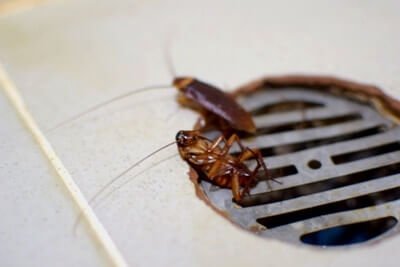

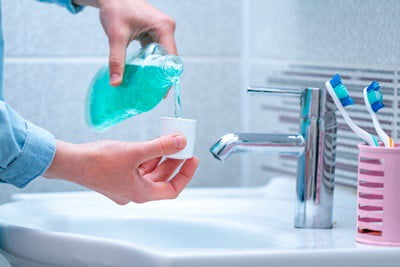
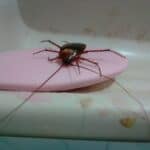

I have been battling cockroaches, big and small for several months. I have used baking soda, bay leaves, vinegar, bug spray, traps and they are still there. I had a feeling they were coming from my dishwasher – for other reasons I am getting a new dishwasher. When we pulled the old dishwasher out, there was a nest of them. We sprayed and they died, but I still have them running around. Mostly in the night when the lights are off. I am tired of fighting them and would like to be sure they are gone before I have my new dishwasher installed. Do you have any suggestions as to how I can get rid of them????